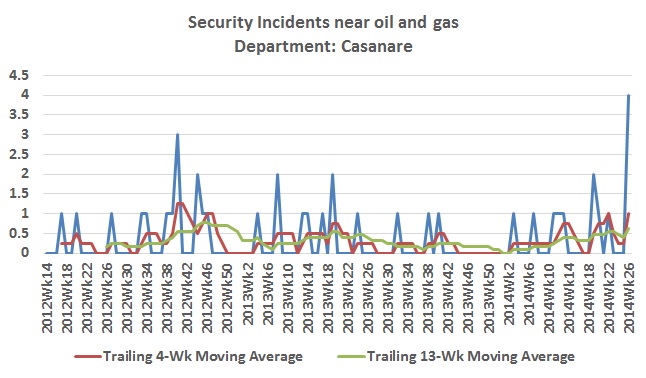We think average realized Colombian oil prices could be up as much as 3% when 2Q14 results are reported because Brent and especially WTI have risen consistently.
Ecopetrol (NYSE:EC) goes to school, calls for young talent and names a queen, while Parex (TSX:PXT) shows up with an ambulance and Amerisur helps medical checkups. These and other stories related to Corporate Social Responsibility.
The ELN guerrilla staged a devastating attack on the Coveñas/Caño Limon pipeline on Sunday which is leading many to question the government’s strategy of holding peace talks without guarantees of a cease fire.

The department of Casanare has felt an uptick in attacks which have included selective targeting of individuals, burned tanker trucks and leaflets threatening an “armed strike” by the ELN guerrilla as its 50 year anniversary approaches on the 4th of July.
The National Authority of Environmental Licenses (ANLA) has placed “preventative measures” on a water disposal operation for the Rancho Hermoso project in Casanare, which is operated by Canacol Energy (TSX:CNE) in partnership with Ecopetrol (NYSE:EC).
Without really planning it this way, this month’s report has several articles on the same topic: the relationship between the industry and the community.
Ecopetrol (NYSE:EC) and Oxy (NYSE:OXY) have reached an agreement to apply an injection technology that they say will render 200 million additional barrels from the aging Teca-Corcorná field.
Ecopetrol (NYSE:EC) published a summary of advances made following an agreement with the U’WA community that allowed it to access the damaged Coveñas/Caño Limón pipeline in May. The NOC says it has kept up its part of the bargain but indigenous leaders still oppose exploration activities in the area.
The USO urged workers to not be tempted into the feeling of comfort and bliss following Colombia’s historical advance in the FIFA World Cup, reminding affiliates that Ecopetrol (NYSE:EC) has yet to withdraw its list of demands.
Based on numbers from 2011, the hydrocarbons industry produced more than 92,000 tons of toxic waste, which represents some 43.5% of all toxic waste produced in the country, according to a report from waste management firm Tecniamsa.